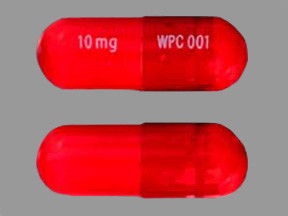PHENOXYBENZAMINE - ORAL
PHONETIC PRONUNCIATION: (fen-OX-ee-BEN-za-meen)
COMMON BRAND NAME(S): Dibenzyline
GENERIC NAME(S): phenoxybenzamine HCl
Uses
USES: This medication is used to treat high blood pressure and heavy sweating due to a certain tumor of the adrenal glands (pheochromocytoma). Phenoxybenzamine belongs to a class of drugs known as alpha blockers. It works by relaxing and widening blood vessels so that blood can flow more easily.
How to use PHENOXYBENZAMINE - ORAL
HOW TO USE: Take this medication by mouth with or without food, usually 2 to 3 times daily or as directed by your doctor. Dosage is based on your medical condition and response to therapy. Use this medication regularly in order to get the most benefit from it. To help you remember, take it at the same times each day. It is important to continue taking this medication even if you feel well. Most people with high blood pressure do not feel sick. Do not suddenly stop taking this medication without consulting your doctor. Your condition may become worse when the drug is suddenly stopped. Your dose may need to be gradually decreased. Inform your doctor if your condition worsens (e.g., your routine blood pressure readings increase).
Side Effects
Precautions
Interactions
Overdose
Images

- color
- scarlet
- shape
- oblong
- imprint
- PAR, 260

- color
- red
- shape
- oblong
- imprint
- WPC 001, 10mg
Reviews
Faq for PHENOXYBENZAMINE - ORAL
Phenoxybenzamine is an oral medication that belongs to a class of drugs called alpha blockers. It is used to treat high blood pressure, certain urinary problems, and an adrenal gland tumor called pheochromocytoma.
Phenoxybenzamine works by relaxing and widening the blood vessels, allowing blood to flow more easily. This helps to lower blood pressure and improve urinary symptoms.
The most common side effects of phenoxybenzamine include dizziness, drowsiness, lightheadedness, nasal congestion, headache, nausea, and vomiting. These side effects are usually mild and go away on their own.
Phenoxybenzamine is usually taken orally with or without food. The dosage and frequency will be determined by your doctor based on your condition. It is important to follow your doctor's instructions and not exceed the prescribed dose.
Phenoxybenzamine is not recommended for use during pregnancy unless absolutely necessary. It may harm the unborn baby. It is also not known if the drug passes into breast milk, so it is advised to consult with your doctor before taking this medication while breastfeeding.
Phenoxybenzamine may interact with other medications, including certain antidepressants, antipsychotics, and blood pressure medications. It is important to inform your doctor about all the medications you are taking, including over-the-counter drugs and herbal supplements, to avoid any potential interactions.
Phenoxybenzamine may take several weeks to reach its full effect in treating high blood pressure. It is important to continue taking the medication as prescribed by your doctor, even if you do not notice immediate results.
No, you should not stop taking phenoxybenzamine suddenly without consulting your doctor. Abruptly discontinuing the medication may cause a sudden rise in blood pressure, leading to serious complications. Your doctor will advise you on the proper way to taper off the medication if necessary.
Phenoxybenzamine may cause drowsiness and dizziness, so it is important to avoid activities that require mental alertness, such as driving or operating machinery. It is also important to limit alcohol consumption as it can worsen these side effects.
Disclaimer
IMPORTANT: HOW TO USE THIS INFORMATION: This is a summary and does NOT have all possible information about this product. This information does not assure that this product is safe, effective, or appropriate for you. This information is not individual medical advice and does not substitute for the advice of your health care professional. Always ask your health care professional for complete information about this product and your specific health needs.
No Reviews Yet